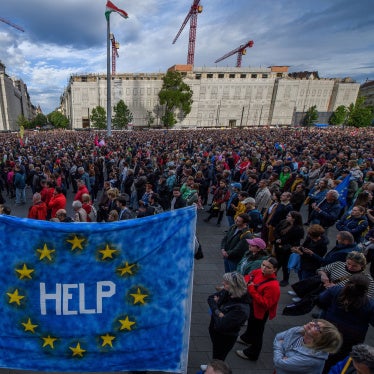Russian forces have looted homes in several of the districts under their control.
Dozens of people interviewed by Human Rights Watch said that their homes had been stripped of all foodstuffs and valuables -- sometimes including the floorboards -- by groups of armed soldiers, who sometimes came ready with military vehicles to carry away their loot.
"Looting was a terrible problem in the 1994-1996 war in Chechnya," said Holly Cartner, executive director of Human Rights Watch's Europe and Central Asia division. "It is a violation of international humanitarian law, and it must be stopped."
Soldiers have not only looted basic food supplies stored for winter, but also taken anything of value from homes, often after their inhabitants have fled. As displaced persons have begun to filter back into Russian-controlled areas, they have found their homes emptied. Some of those people have then returned to Ingushetia in search of food and shelter.
Markha Isaeva, from the village of Mekenskaia in the Naurskii district, reported that when she returned to her house in mid-November from Ingushetia, it was stripped practically bare. Soon after her return, she witnessed how soldiers took mattresses, pillows, and even ripped the floorboards and window frames from her neighbors' home. When she asked the soldiers why they were taking them, they answered: "We've got to have fuel for our stoves...we've got to build shields for our positions ['blindazhi,' in Russian]." Isaeva had fled her home during bombing in the beginning of October.
"Zina," a 43-year-old agronomist, left her village of Assinovskaia—close to the Ingush border— on October 7 and returned on the afternoon of November 18 to find it emptied of all dishes, bedding, canned goods, and other food supplies, as well as the television and VCR. She said that when she entered her house, a soldier was standing in the main room pulling an electrical outlet out of the wall. "I put in that outlet myself," she recounted, "and I asked him, ‘Why are you tearing it out of the wall?' and he said ‘I need it.'"
Human Rights Watch interviewed four witnesses to looting in the town of Sernovodsk, about five kilometers north of Assinovskaia. Zara Magomadova, 47, told Human Rights Watch, "My own cow, they killed it before my eyes and hauled it away...My chickens, right in front of me, they went like this [making a strangling motion with two hands] and took them too."
Sheima Mazaeva recounted in detail how soldiers took household goods from number 2, number 14, and number 18 Assinovskaia Street. She said that soldiers came to her house, opened the gates and asked, "Do you have a cow or a bull?" They then searched her yard and found nothing. "Lucky for you, you don't have anything," they told her. She reported that soldiers came back to the houses on the street nearly every day to check for more goods. "The same ones came again and again—I know their faces now," Mazaeva told Human Rights Watch. On another occasion they asked her "Granny, do you have any flour?" She said they took the only bag of flour she had.
"Leila," 53, from Sernovodsk, returned to her home on November 17 at 10:20 a.m. She said that her television, VCR, radio, bed linens, mattresses, rugs, and clothing were missing. "The only thing they left was the refrigerator," she told Human Rights Watch. She said she saw soldiers drive a military truck with a wagon into the courtyard belonging to her neighbor, Salam Shavkhalov. According to "Leila," there were fifteen soldiers with machine guns loading household goods, including a refrigerator, onto the truck.
On November 15, Ruslan Baisugurov, 32, was visiting his parents in the village of Ermolovskii. As his car was stalled on a residential street, he saw two armored personnel carriers drive up. He told Human Rights Watch that he saw several soldiers go up to the first house they came upon and start to load household goods into the back of the vehicles: mattresses, pillows, blankets, rugs. "They took everything, loaded it quickly and left," he told Human Rights Watch.
Other witnesses have related incidents of soldiers taking the clothes off the backs of civilians on the street. According to Dagman Agmanova, a soldier took the coat off the back of her friend, Zora Adueva, in Sernovodsk on November 17. She said the soldier reportedly did not return to Mrs. Aduev her documents, which were in the coat pocket. At least five witnesses expressed to Human Rights Watch their conviction that any attempt to complain to Russian commanders about looting would be senseless.
The Russian army command in Chechnya has recently encouraged residents to return to the towns of Sernovodsk and Assinovskaia, among others now under their control. Many displaced people interviewed at the Chechen-Ingush border said they were heading back to their homes to prevent them from being looted by the Russian forces. According to Ingush border guards, 1114 people returned to Chechnya on November 19, while 1802 people entered Ingushetia.
The laws of war expressly prohibit inhumane treatment of the civilian population. Pillage is explicitly forbidden in Protocol II additional to the 1949 Geneva Conventions, to which Russia is a party.







